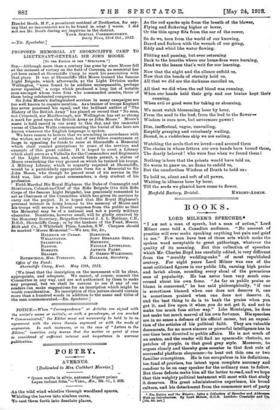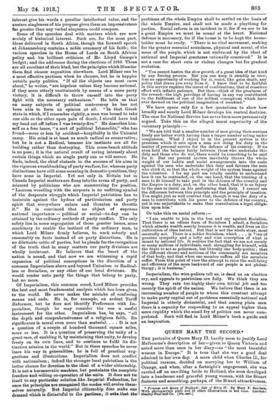BOOKS.
LORD MILNER'S SPEECHES.*
"1 Ara not a man of speech, but a man of action," Lord Milner once told a Canadian audience. "No amount of practice will ever make speaking anything but pain and grief to me." Fcw men have less of those arts which make the spoken word acceptable to great gatherings, whatever the quality of its meaning. But this collection of speeches which Mr. Charles Boyd has carefully edited, is very different from the "mouldy wedding-cake" of most republished oratory. For eight years Lord Milner was one of the most criticised figures in our public life, earning high praise and lavish abuse, sounding every shoal of the precarious seas of popularity. He has never been very much con. cerned about his own fame. "As far as public praise or blame is concerned," be has said philosophically, "if one is sometimes blamed when one does not deserve it, one is sometimes praised when one does not deserve it, and the best thing to do is to bank the praise when you get it, and live upon it when you do not get it, and not to make too much fuss either way." Like Montaigne, he does not make too much marvel of his own fortunes. His speeches are in no sense a defence of his official career, but an exposb tion of the articles of his political faith. They are valuable documents, for no more sincere or powerful intelligence has in our time been directed to public affairs. He is not much of an orator, and the reader will find no spasmodic rhetoric, no patches of purple, in that good gray style. Moreover, he argues closely and thereby goes counter to that first rule of successful platform eloquence7-to beat out thin one or two familiar conceptions. He is too scrupulous in his definitions, too fond of provisos, too intent upon complete accuracy and candour to be an easy speaker for the ordinary man to follow. But these defects make him all the better to read, and we hope that this weighty political testament will meet with that study it deserves. His great administrative experience, his broad culture, and his detachment from the commoner sort of party • Th. Nation and the Empire bring a Collection of Speeches and Addreses& With as Istroduation. By Lord Milner, O.C.B. London; Constable and Ca. [10s. 6d. net.] .
interest give his words a peculiar intellectual value, and the austere singleness of his purpose gives them an impressiveness far greater than any verbal eloquence could compass.
Some of the speeches deal with matters which are now mainly of historical interest. Such are, for the most part, those delivered in South Africa, though the farewell speech at Johannesburg contains a noble summary of his faith ; the various speeches in the House of Lords on South African policy and his brilliant criticism of Mr. Lloyd George's budget; and the addresses during the elections of 1910. These are all excellent of their kind, but the principles which illumine them find clearer exposition elsewhere. Lord Milner can be a most effective partisan when he chooses, but he is happier outside party politics. "If all the objects one most cares about," he writes, " are hopeless unless they become national, if they seem utterly unattainable by means of a mere party victory, it is difficult to throw oneself into the • party fight with the necessary enthusiasm." He tells us that on many subjects of political controversy he has not been able to form an opinion at all. " In that Greek state in which, if I remember rightly,s man was bound to take one side or the other upon pain of death, I should have had my head cut off before .I was twenty-five." He describes him- self as a free lance, "a sort of political Ishmaelite," who has found—more or less by accident—hospitality in the Unionist camp. His mind is at least as much radical as conservative; but he is not a Radical, bemuse his instincts are all for building rather than destroying. This cross-bench attitude is no pose; it is the natural result of caring intensely about certain things which no single party can or will secure. He finds, indeed, the chief obstacle to the success of his aims in the vigorous swashbuckling of party warfare, for, whereas party distinctions have still some meaning in domestic questions, they have none in Imperial. Yet not only in Britain but in Canada Imperial matters are flung into the arena of party, and misused by politicians who are manoeuvring for position. "Laocoon wrestling with the serpents is no unfitting symbol of the desperate struggle which Imperial patriotism has to maintain against the hydras of particularism and party spirit that everywhere enlace and threaten to throttle it." He is convinced that no object of supreme national importance — political or social—to-day can be attained by the ordinary methods of party conflict. The only safety lies in some segregation of those greater issues, some machinery to enable the instinct of the ordinary man, in which Lord Milner firmly believes, to work soberly and reasonably on facts instead of on party distortions. He is no dilettante critic of parties, but he pleads for the recognition of the truth that in many matters our party divisions are wholly irrelevant. He believes that the heart of the nation is sound, and that now we are witnessing a rapid expansion of political conceptions in the direction of a common Imperialism above and beyond Unionism or Radical- ism or Socialism, or any other of our local divisions. He would render unto party the things that belong to party, but no more.
Of Imperialism, this common creed, Lord Milner provides the best and most fundamental analysis which has been given to the world. He never makes the mistake of confusing means and ends. He is, for example, an ardent Tariff Reformer, but he does not identify Preference with Im- perialism, though he may consider the, one a useful instrument for the other. Imperialism has, he says, "all the depth and comprehensiveness of a religious faith, Its significance is moral even more than material. . . . It is not a question of a couple of hundred thousand square miles, more or less. It is a question of preserving the unity of a great race, of enabling it, by maintaining that unity, to develop freely on its own lines, and to continue to fulfil its dis- tinctive mission in the world." But in these speeches he never loses his .way in generalities; he is full of practical sug- gestions and illustrations. Imperialism does not conflict with nationalism ; indeed the stronger local patriotism is the better chance for devotion to the ideal of a wider citizenship. It is not a bureaucratic machine, but postulates the complete freedom and willing co-operation of_ the units. It does not tie itself to any particular solution like Imperial Federation, for once the principles are recognized the modes will, evolve them- selves naturally. But Imperial citizenship does make one demand *hick is distasteful to tire partisan; it asks-that the:
problems of the whole Empire shall be settled on the basis of the whole Empire, and shall not be made a plaything for parties. Social reform is an incident in it, for if we are to be a great Empire we must be sound at the heart. National defence is necessary, for if the house is to be kept the house- holder must be ready. " There is no vital movement, making for the greater essential soundness, physical and moral, of the mass of the people, which is not embraced by the ideal of national and Imperial greatness rationally conceived." It is not a case for short cuts or violent changes but for gradual evolution.
" You cannot hasten the slow growth of a great idea of that kind by any forcing process. But you can keep it steadily in view, lose no opportunity of working for it, resist, like grim death, any policy that draws you away from it. I know that to be faithful in this service requires the rarest of combinations, that of ceaseless effort with infinite patience. But then—think of the greatness of the reward—the high privilege of having in any way contributed to the fulfilment of one of the noblest conceptions which have ever dawned on the political imagination of mankind."
We have space only for a few quotations to show how broadly and sanely Lord Milner develops his central doctrine. The case for National Service has never been more persuasively argued. Take this on the alleged moral superiority of the voluntary principle :- " We are told that a smaller number of men giving their services freely are better worth having than a larger number acting under compulsion. What I object to in the present system is the premium which it sets upon a man not doing his duty in the matter of personal service for the defence of his country. If we even held the balance fairly between those who undertake this duty and those who do not, there would be something to be said for it. But our present system inevitably throws the whole weight of our habits and social arrangements into the scale against the men who undertake this duty and favours the men who shirk it, so that the whole weight of the system leans against the volunteer. I for my part am totally unable to understand how it can be contended, on the one hand, that the training of a, man to fit himself to take part in the defence of the country and the Empire is a duty, and, on the other hand, that it is an injury to the man to insist on his performing that duty. I cannot see the difference between this principle and the principle of taxation. You might just as well contend that, though it was the duty of a man to contribute with his purse to the defence of the country, yet it was unjustifiable to make that contribution a legal obliga- tion upon him."
Or take this on social reform:-
" I am unable to join in the hue and cry against Socialism. That there is an odious form of Socialism I admit, a Socialism which attacks wealth merely because it is wealth, and lives on the cultivation of class hatred. But that is not the whole story, most assuredly not. There is a nobler Socialism, which . . . is born of genuine sympathy and a lofty and wise conception of what is meant by national life. It realizes the fact that we are not merely so many millions of individuals, each struggling for himself, with. the State to act as policeman, but literally one .body-politic; that the different classes and sections of the community are members of that body, and that when one member suffers all the members suffer. From this point of view the attempt to raise the well-being and efficiency of the more backward of our people is not philan- thropy; it is business."
Imperialism, the wire-pullers tell us, is dead as an election. cry, and appeals to patriotism are folly. We think they are wrong. They rate too highly their own trivial job and too meanly the spirit of the nation. We believe that there is an increasing number of people to whom this constant attempt to make party capital out of problems essentially national and Imperial is utterly distasteful, and that among plain men there is a capacity for responding to an appeal higher than mere cupidity which the small fry of politics can never com- prehend. Such will find in Lord Milner's book a guide and an inspiration.











































 Previous page
Previous page